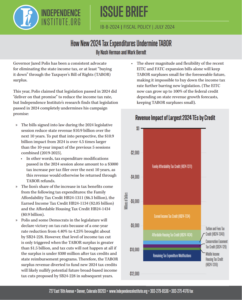Governor Jared Polis has been a consistent advocate
for eliminating the state income tax, or at least “buying
it down” through the Taxpayer’s Bill of Rights (TABOR)
surplus.
This year, Polis claimed that legislation passed in 2024 did
“deliver on that promise” to reduce the income tax rate,
but Independence Institute’s research finds that legislation
passed in 2024 completely undermines his campaign
promise:
» The bills signed into law during the 2024 legislative
session reduce state revenue by $10.9 billion over the
next ten years. To put that into perspective, the $10.9
billion impact from 2024 is over 4.5 times larger
than the 10-year impact of the previous five sessions
combined (2019-2023).
• In other words, tax expenditure modifications
passed in the 2024 session alone amount to a $3000
tax increase per tax filer over the next ten years, as
this revenue would otherwise be returned through
TABOR refunds.
» The lion’s share of the increase in tax benefits come
from the following tax expenditures: the Family
Affordability Tax Credit HB24-1311 ($6.3 billion), the
Earned Income Tax Credit HB24-1134 ($2.05 billion)
and the Affordable Housing Tax Credit HB24-1434
($0.9 billion).
» Polis and some Democrats in the legislature will
declare victory on tax cuts because of a one-year
rate reduction from 4.40% to 4.25% brought about
by SB24-228. However, that level of income tax cut
is only triggered when the TABOR surplus is greater
than $1.5 billion, and tax cuts will not happen at all if
the surplus is under $300 million after tax credits and
state reimbursement programs. Therefore, the TABOR
surplus revenue diverted to fund new 2024 tax credits
will likely nullify potential future broad-based income
tax cuts proposed by SB24-228 in subsequent years.
• The sheer magnitude of the recent
EITC and FATC expansion bills alone will keep
TABOR surpluses small for the foreseeable future,
making it impossible to buy down the income tax
rate further barring new legislation. (The EITC
now can grow up to 100% of the federal credit
depending on state revenue growth forecasts,
keeping TABOR surpluses small).









